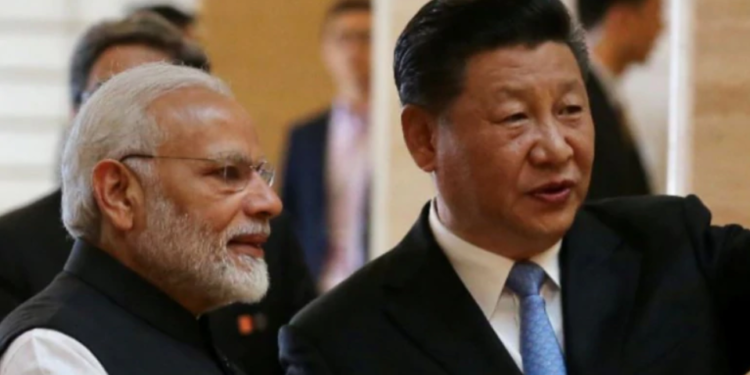The second informal summit between India and China is scheduled to take place in the second week of this month. The coastal town of Mamallapuram, south of Chennai in Tamil Nadu will be the venue of the informal summit between PM Modi and Chinese President Xi Jinping. The first informal summit has taken place in Wuhan in China in this month of April last year.
Mamallapuram as the venue of the informal summit is not just an arbitrary choice but has a well thought out subtle hint attached to it. The coastal town shares ancient links with China going back about 2000 years ago. The town was the sea port of the Pallava dynasty who had even sent their envoys to China. There is also archaeological evidence in the form of Chinese coins, suggesting trade links between the historical town and the dragon city.
While the ancient connection of the coastal town with China is being seen as a historic fillip to the informal summit, there is a subtle hint that the move of choosing Mamallapuram as the venue for the informal summit gives that cannot be overlooked.
It is important to mention here that the earliest recorded security pact between India and China had been signed way back in the 8th century that involved the Pallava king, Rajasimhan, or Narasimha Varma II. The Chinese had at that time sought help from the Pallava ruler to counter Tibet which had at that time emerged as a big threat to China. Several centuries later, the Chinese would go on to invade and occupy Tibet.
Kayal Barabhavan, author of ‘Bodi Dharma’, a four-part Tamil novel based on the Pallava dynasty had said, “The agreement between Chinese rulers and Pallava king Raja Simhan II or Narasimhavarman II during the early 8th century was the first strategic pact on security between the two kingdoms. Chinese declared Narasimhavarman II as the general of South China to take on Tibet as the latter had emerged a strong power and a threat to China at that point of time.”
Mamallapuram symbolises thriving trade and security relations between India and China, and how an Indian Kingdom protected China’s interests when it was in need of help. This is significant as the modern Chinese regime is largely disrespectful towards India’s sovereignty and constantly works against India’s geopolitical and internal security interests, in tandem with Pakistan. This is unlike India, even in current times, as it has stayed out of China’s internal affairs, be it regarding Tibet or Xinjiang.
It must be noted that a lot has changed ever since the informal summit between the two countries took place in Wuhan. China on the other hand has witnessed a number of economic and geo-political stebacks, the biggest one obviously being the ongoing US-China trade war. As opposed to this, the Indo-US relations seem to be exuberating with unprecedented positivity, especially after the “Howdy Modi!” event. The Indo-US relations are poised to become warmer given the trade war between China and the US, as India stands to gain big. There have already been indications of a major shift taking place in this direction as American companies might look towards India, which is fast emerging as the ideal investments destination.
India has also steered out of the outrage manufactured by China and Pakistan on the issue of Kashmir, as other superpowers and nations have respected India’s decision to abrogate article 370, and world seems to have recognised that it is indeed an internal matter to India. While China, after having shown blatant disregard for India’s sovereignty, stands exposed, India sits in a far more comfortable situation today and has a higher position of power at the negotiating table.
The China-Russia relations which seemed to give the dragon an upper hand in East Asia, has largely been replaced by the euphoria generated by strengthening of Indo-Russia ties and the triangular relationship of Russia, India and Japan. India’s move to extend a line of credit to develop the Russian Far East has given an absolutely new dimension to Indo-Russia relations incorporating economics alongside military relations which have traditionally formed an intrinsic part of the bilateral relations between the two countries. The new geopolitical equations give India a position of strength and relative advantage compared to April 2018 and the move to choose Mamallapuram as the venue for the informal summit ought to be seen in that light.
This subtle hint by India about the changing fortunes of nations is going to give a subtle yet effective hint to the dragon country. This fits perfectly in the ongoing narrative as well given the kind of stance that China has taken over the Kashmir issue ever since India abrogated Article 370 thereby revoking its special status. By expressing ‘concern’ over the situation in Kashmir, what China was pursuing was its own strategic interest in Kashmir. China is deeply entrenched in Kashmir with its occupation of Aksai Chin and trans-Karakoram in Pakistan occupied Kashmir that Pakistan had given away to the dragon way back in 1963. Moreover, with Chinese investments and the CPEC in particular in Pakistan occupied Kashmir (PoK), China harbours ambitions of looking at itself as a major player in Kashmir.
It is relevant to mention here that after China’s objectionable utterances over India’s Kahsmir move, Modi government had reminded China of its internal issues without making any particular references. India also made it clear that it doesn’t believe in interfering in the internal matters of other counties and also expected other countries to do likewise. India has therefore, by choosing Mamallapuram sent out a very subtle yet significant hint to China without even referring to any of China’s internal affairs.




























